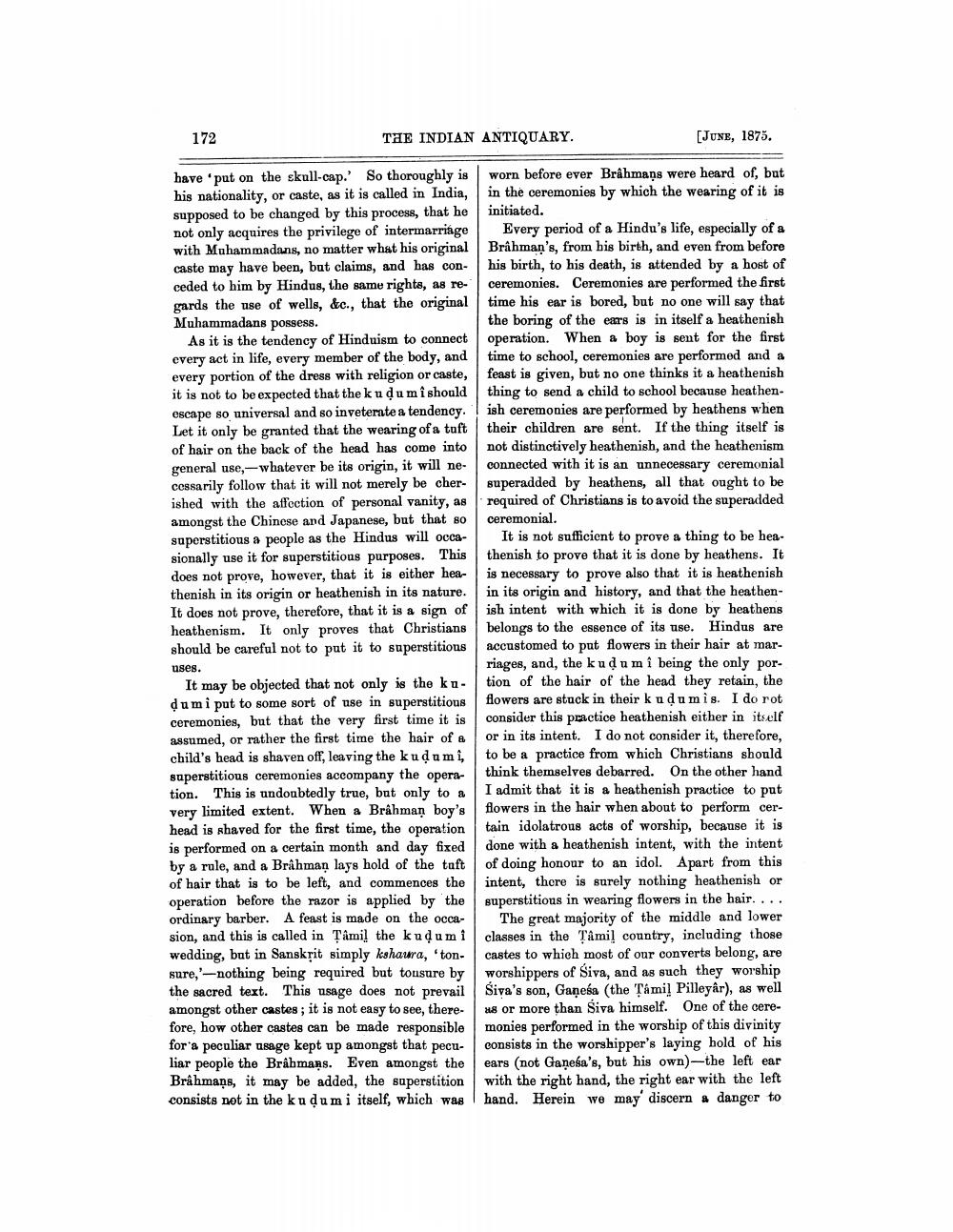________________
172
THE INDIAN ANTIQUARY.
[JUNE, 1875.
have put on the skull-cap.' So thoroughly is worn before ever Brâhmans were heard of, but his nationality, or caste, as it is called in India, in the ceremonies by which the wearing of it is supposed to be changed by this process, that he initiated. not only acquires the privilege of intermarriage Every period of a Hindu's life, especially of a with Muhammadans, no matter what his original Brahman's, from his birth, and even from before caste may have been, but claims, and has con- his birth, to his death, is attended by a host of ceded to him by Hindus, the same rights, as re- ceremonies. Ceremonies are performed the first gards the use of wells, &c., that the original time his ear is bored, but no one will say that Muhammadans possess.
the boring of the ears is in itself a heathenish As it is the tendency of Hinduism to connect operation. When a boy is sent for the first every act in life, every member of the body, and time to school, ceremonies are performed and a every portion of the dress with religion or caste, feast is given, but no one thinks it a heathenish it is not to be expected that the kudu m i should thing to send a child to school because heathenescape so universal and so inveterate a tendency. ish ceremonies are performed by heathens when Let it only be granted that the wearing of a tuft their children are sent. If the thing itself is of hair on the back of the head has come into not distinctively heathenish, and the heathenism general use, whatever be its origin, it will ne- connected with it is an unnecessary ceremonial cessarily follow that it will not merely be cher- superadded by heathens, all that ought to be ished with the affection of personal vanity, as required of Christians is to avoid the superadded amongst the Chinese and Japanese, but that so ceremonial superstitious a people as the Hindus will coca- It is not sufficient to prove a thing to be heasionally use it for superstitious purposes. This thenish to prove that it is done by heathens. It does not prove, however, that it is either hea- is necessary to prove also that it is heathenish thenish in its origin or heathenish in its nature. in its origin and history, and that the heathenIt does not prove, therefore, that it is a sign ofish intent with which it is done by heathens heathenism. It only proves that Christians belongs to the essence of its use. Hindus are should be careful not to put it to superstitions accustomed to put flowers in their hair at maruses.
riages, and, the kudumi being the only porIt may be objected that not only is the ko- tion of the hair of the head they retain, the dum i put to some sort of use in superstitious flowers are stuck in their kudumis. I do rot ceremonies, but that the very first time it is consider this practice heathenish either in itself assumed, or rather the first time the hair of a or in its intent. I do not consider it, therefore, child's head is shaven off, leaving the kudumi, to be a practice from which Christians should superstitious ceremonies accompany the opera- think themselves de barred. On the other hand tion. This is undoubtedly true, but only to a I admit that it is a heathenish practice to put very limited extent. When a Brâhman boy's flowers in the hair when about to perform cerhead is shaved for the first time, the operation tain idolatrous acts of worship, because it is is performed on a certain month and day fixed done with a heathenish intent, with the intent by a rule, and a Brahman lays hold of the tuft of doing honour to an idol. Apart from this of hair that is to be left, and commences the intent, there is surely nothing heathenish or operation before the razor is applied by the superstitious in wearing flowers in the hair. ... ordinary barber. A feast is made on the occa- The great majority of the middle and lower sion, and this is called in Tamil the kudumi classes in the Tamil country, including those wedding, but in Sanskrit simply kshaura, 'ton- castes to which most of our converts belong, are sure,'-nothing being required but tousure by worshippers of Siva, and as such they worship the sacred text. This usage does not prevail Siva's son, Gaņeśa (the Tamil Pilleyâr), as well amongst other castes; it is not easy to see, there 28 or more than Siva himself. One of the cerefore, how other castes can be made responsible monies performed in the worship of this divinity for'a peculiar usage kept up amongst that pecu- consists in the worshipper's laying hold of his liar people the Brahmans. Even amongst the ears (not Gaņeśa's, but his own)-the left ear Brahmaņs, it may be added, the superstition with the right hand, the right ear with the left consists not in the kudumi itself, which was hand. Herein we may discern a danger to




